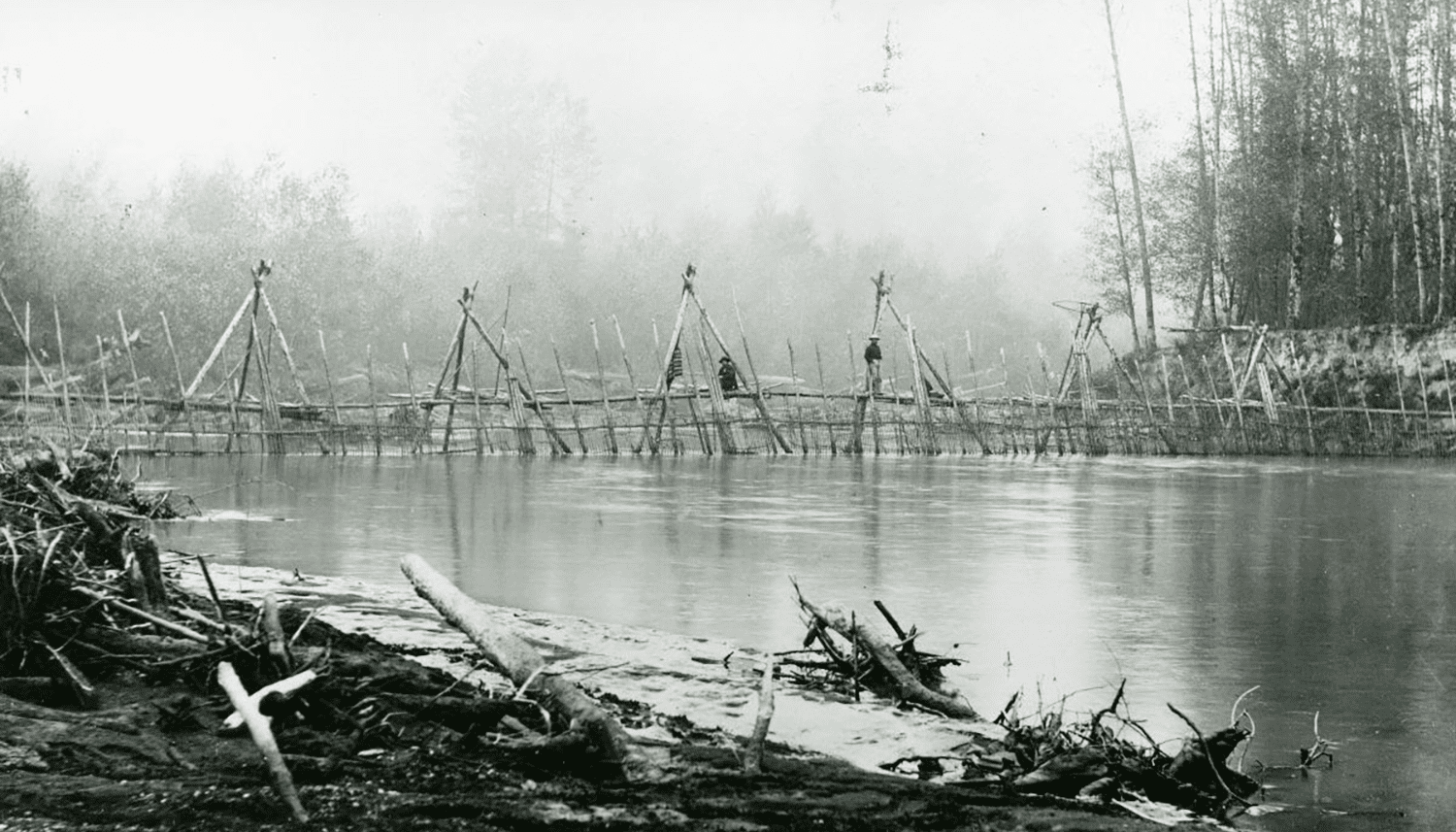
Media Contact:
Dr. William Atlas, Wild Salmon Center, 778-938-6883, [email protected]
Adrian Tuohy, Wild Fish Conservancy, 253-709-9364 [email protected]
December 9, 2020 — A publication released today in BioScience suggests that a return to historical Indigenous fishing practices and systems of salmon management may be key to revitalizing struggling Pacific Salmon fisheries across the North Pacific.
The article, titled Indigenous Systems of Management for Culturally and Ecologically Resilient Pacific Salmon (Oncorhynchus spp.) Fisheries, is authored by a collection of accomplished Indigenous leaders and fisheries scientists from the United States and Canada. Wild Fish Conservancy is proud to announce its own Adrian Tuohy serves as one of the paper’s co-authors.
In the paper, the authors document how Indigenous communities of the North Pacific sustainably harvested salmon for thousands of years by fishing in or near rivers with low-impact selective fishing tools like fish traps, weirs, wheels, reef nets, and dip nets. After the arrival of European settlers, traditional Indigenous fisheries and governance systems were suppressed, giving way to the mostly unsustainable mixed-stock commercial fishing practices of today that commonly occur in the ocean with non-selective tools such as gill nets.
“As they’re currently built, mixed-stock salmon fisheries are undermining the biodiversity needed for Pacific salmon to thrive,” says Dr. Atlas, lead author of the publication and Scientist with the Portland-based Wild Salmon Center. “Luckily, we have hundreds of examples, going back thousands of years, of better ways to fish. These techniques can deliver better results for all communities.”
The publication reviews historical methods of Indigenous salmon fishing and management, exploring the benefits of terminal fisheries and selective fishing tools able to release bycatch (nontarget species) unharmed. By targeting salmon runs in-river—rather than in the ocean, where both healthy and threatened stocks intermingle—Indigenous people harvested individual, known salmon runs as the fish made their homeward migration to natal rivers. Furthermore, Indigenous groups used low-impact selective fishing tools to selectively target specific salmon runs, similar in concept to Wild Fish Conservancy’s fish trap in the lower Columbia River which enables bycatch of threatened and endangered fish to be safely released to reach upriver spawning grounds with nearly 100% survival rates.
The authors of the publication propose reforming status quo management practices that have failed to rebuild, or sustainably manage, struggling wild Pacific Salmon populations. According to the authors, restoring governance, place-based management systems, and methods of in-river selective harvest grounded in Indigenous knowledge can help revitalize Pacific Salmon fisheries and more equitable fishing opportunities for Indigenous and non-Indigenous coastal fishing communities alike across the North Pacific.
“Conventional harvest and hatchery management have mostly failed to maintain or restore wild salmon and steelhead south of the Aleutians,” says co-author Adrian Tuohy, a Biologist with the Washington-based non-profit Wild Fish Conservancy. “By returning to place-based salmon management systems, selective gears, and terminal in-river salmon fisheries historically embraced by Indigenous communities, we can address many of the primary limiting factors to recovery of wild salmon and steelhead while benefiting coastal fishing communities across the region.”
###
Wild Fish Conservancy (WFC) is a nonprofit conservation ecology organization headquartered in Washington State and dedicated to preserving, protecting and restoring the northwest’s wild fish and the ecosystems they depend on, through science, education and advocacy.
Learn more about Wild Fish Conservancy’s selective harvest and fish trap research at wildfishconservancy.org or thefishtrapjournal.org, WFC’s online field journal dedicated to this research project.
WFC Publications Cited in this New Publication:
Modified Commercial Fish Trap to Help Eliminate Salmonid Bycatch Mortality, North American Journal of Fisheries Management, Tuohy et al. 2020, https://doi.org/10.1002/nafm.10496
Survival of Salmonids from an Experimental Commercial Fish Trap, Fisheries, Tuohy et al. 2019, https://doi.org/10.1002/fsh.10292
The Failure of Wild Salmon Management: Need for a Place‐Based Conceptual Foundation, Fisheries, Gayeski et al. 2018, https://doi.org/10.1002/fsh.10062
Criteria for a good catch: A conceptual framework to guide sourcing of sustainable salmon fisheries, FACETS, Gayeski et al. 2018, https://doi.org/10.1002/fsh.10062
Join our mailing list to recieve important updates on our work, the latest wild fish news, & opportunities to take action to support wild fish.
This site is protected by reCAPTCHA and the Google Privacy Policy and Terms of Service apply.
Wild Fish Conservancy is recognized as a 501(c)3 non-profit by the IRS